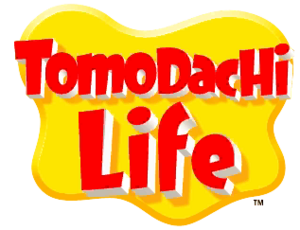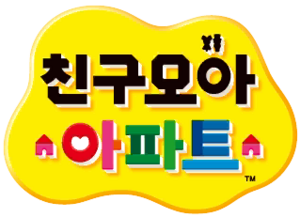Tomodachi (series): Difference between revisions
No edit summary |
|||
| (One intermediate revision by one other user not shown) | |||
| Line 8: | Line 8: | ||
<tab name="North American">[[File:TL Logo.png|300px]]</tab> | <tab name="North American">[[File:TL Logo.png|300px]]</tab> | ||
<tab name="Korean">[[File:TL Logo Korean.png|300px]]</tab> | <tab name="Korean">[[File:TL Logo Korean.png|300px]]</tab> | ||
<tab name="Super Smash Bros. Icon">[[File:TomodachiSymbol.png|100px]]</tab> | |||
</tabs> | </tabs> | ||
|caption=Due to ''[[Tomodachi Collection]]'' not releasing outside of Japan, other regions only have their respective logo of ''[[Tomodachi Life]]'' in order to represent the series. | |caption=Due to ''[[Tomodachi Collection]]'' not releasing outside of Japan, other regions only have their respective logo of ''[[Tomodachi Life]]'' in order to represent the series. | ||
| Line 22: | Line 23: | ||
==Series description== | ==Series description== | ||
The Tomodachi series is composed of only life simulation games, with Miitopia being more focused on role playing elements yet still having a life simulation side. The two main games | The Tomodachi series is composed of only life simulation games, with Miitopia being more focused on role playing elements yet still having a life simulation side. The two main games take place on a virtual [[Island (Tomodachi Life)|island that is named by the player]]. The island is filled with various areas that allow the player to see their Miis taking part in various activities and an apartment building in which the Miis can reside, with a home also being an option for married Miis. The island also has various shops in which the player can buy clothes to personalize their Miis, as well as wallpapers, carpets, and other furniture for their living place. | ||
The Miitomo application however was more centered about the real life social aspect, with the player being highly suggested to share | The Miitomo application, however, was more centered about the real life social aspect, with the player being highly suggested to share their friend code with their contacts in order to answer various questions and to see their friend responses. Various activities, as well as in-game purchases, unlocked more clothes for the player’s Mii and more wallpapers and carpets with which to customize the Mii’s room in the game. Another main focus of the game was the ability to create Miifotos, which were photos of the player's Mii, and share them on social media. | ||
In Miitopia, the player must defeat an evil being called the [[Dark Lord]] that has stolen Mii faces throughout [[Miitopia (island)|Miitopia]]. The social aspect of the game comes into play when the Miis enter [[inn|inns]], scattered all over the island, after clearing a level. Miis may be put into the same room to increase their relationship, and the closer a Mii is to one another, the more those two Miis will be able to attack together and assist each other. | |||
| Line 43: | Line 44: | ||
===Related Games=== | ===Related Games=== | ||
These are entries in the series that don't directly follow the simulation gameplay, but still have enough similarities and links to the Tomodachi series to the point of being able to be considered | These are entries in the series that don't directly follow the simulation gameplay, but still have enough similarities and links to the Tomodachi series to the point of being able to be considered spin-offs. | ||
<gallery class="center" widths="160" heights="80"> | <gallery class="center" widths="160" heights="80"> | ||
Latest revision as of 16:40, 22 April 2024
| Details | |
|---|---|
| First installment | Tomodachi Collection (2009) |
| Last installment | Tomodachi Life (2013) |
| Related serie(s) or game(s) | Related games : Miitopia (2016; 3DS) (2021; Nintendo Switch) Miitomo (2016; iOS/Android) |
| Platform(s) | Nintendo DS Nintendo 3DS |
The Tomodachi series is a series of simulation games starring Miis made by Nintendo that began on the Nintendo DS with the Japan only game Tomodachi Collection continued to receive games with a direct sequel to Tomodachi Collection titled Tomodachi Life released worldwide on the Nintendo 3DS. A few games that could be considered as spin-offs due to their close connection to the series were released as well, being the now discontinued mobile application Miitomo, and the role playing game Miitopia that released on the 3DS and having been remade on Switch with a few enhancements. The Tomodachi series uses Miis for every single important character and NPC that can be seen in every game and is often considered to be the series utilizing Miis the most, with the game focusing on what the Miis are doing instead of including them into games that could have existed without them.
Series description
The Tomodachi series is composed of only life simulation games, with Miitopia being more focused on role playing elements yet still having a life simulation side. The two main games take place on a virtual island that is named by the player. The island is filled with various areas that allow the player to see their Miis taking part in various activities and an apartment building in which the Miis can reside, with a home also being an option for married Miis. The island also has various shops in which the player can buy clothes to personalize their Miis, as well as wallpapers, carpets, and other furniture for their living place.
The Miitomo application, however, was more centered about the real life social aspect, with the player being highly suggested to share their friend code with their contacts in order to answer various questions and to see their friend responses. Various activities, as well as in-game purchases, unlocked more clothes for the player’s Mii and more wallpapers and carpets with which to customize the Mii’s room in the game. Another main focus of the game was the ability to create Miifotos, which were photos of the player's Mii, and share them on social media.
In Miitopia, the player must defeat an evil being called the Dark Lord that has stolen Mii faces throughout Miitopia. The social aspect of the game comes into play when the Miis enter inns, scattered all over the island, after clearing a level. Miis may be put into the same room to increase their relationship, and the closer a Mii is to one another, the more those two Miis will be able to attack together and assist each other.
Cast
The Tomodachi series uses Miis for almost every single character and NPC that can be seen in every game.
Games
Tomodachi Collection
(2009)Tomodachi Life
(2013)
Related Games
These are entries in the series that don't directly follow the simulation gameplay, but still have enough similarities and links to the Tomodachi series to the point of being able to be considered spin-offs.







